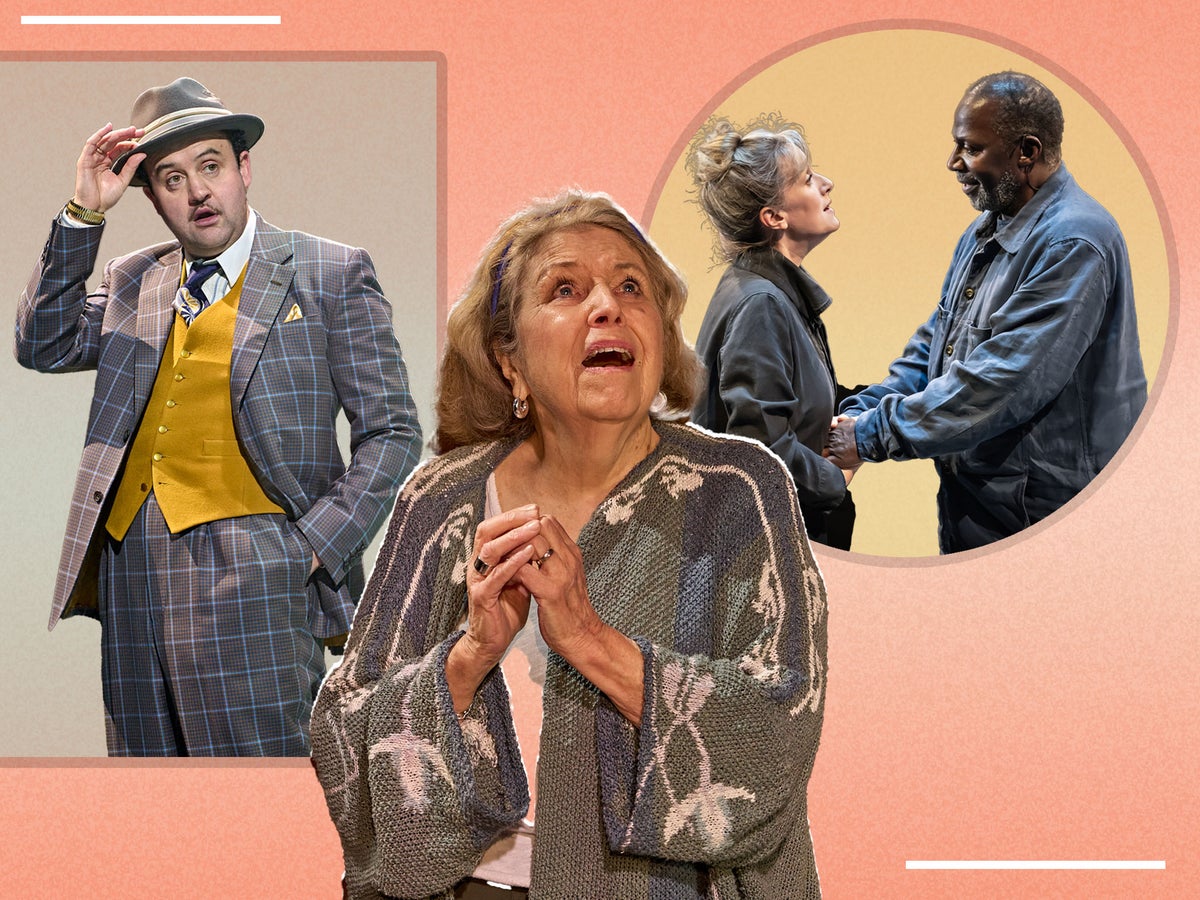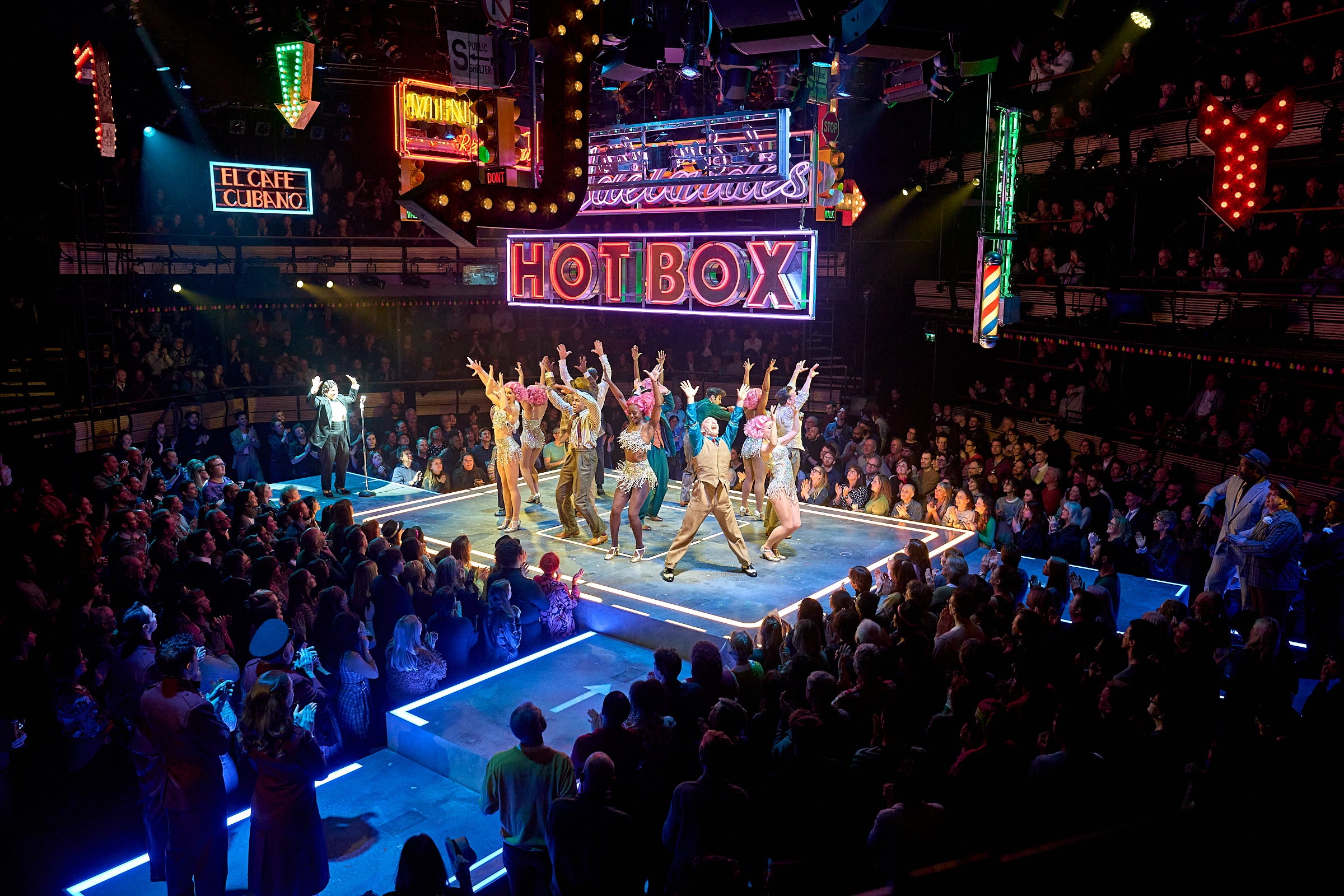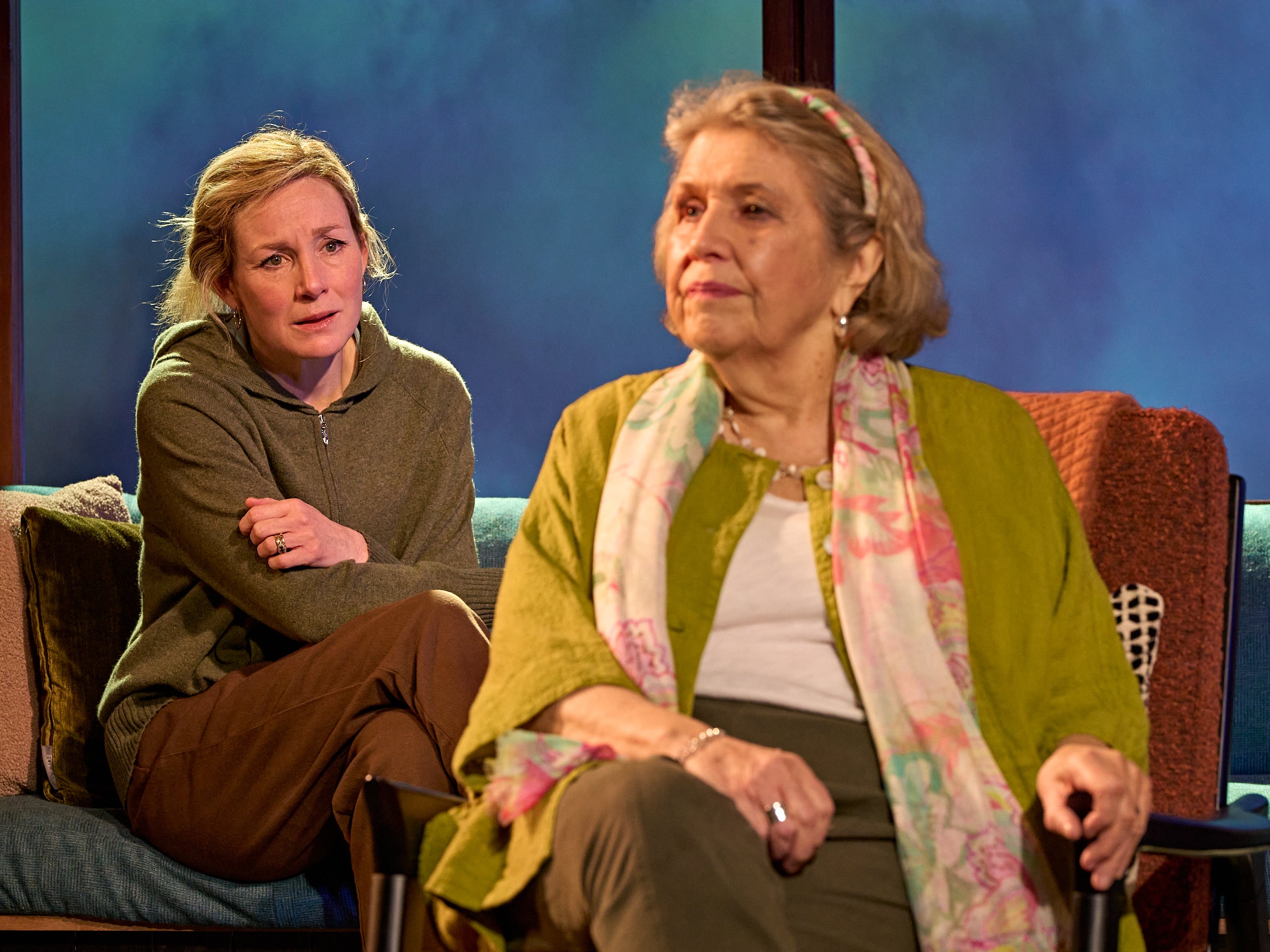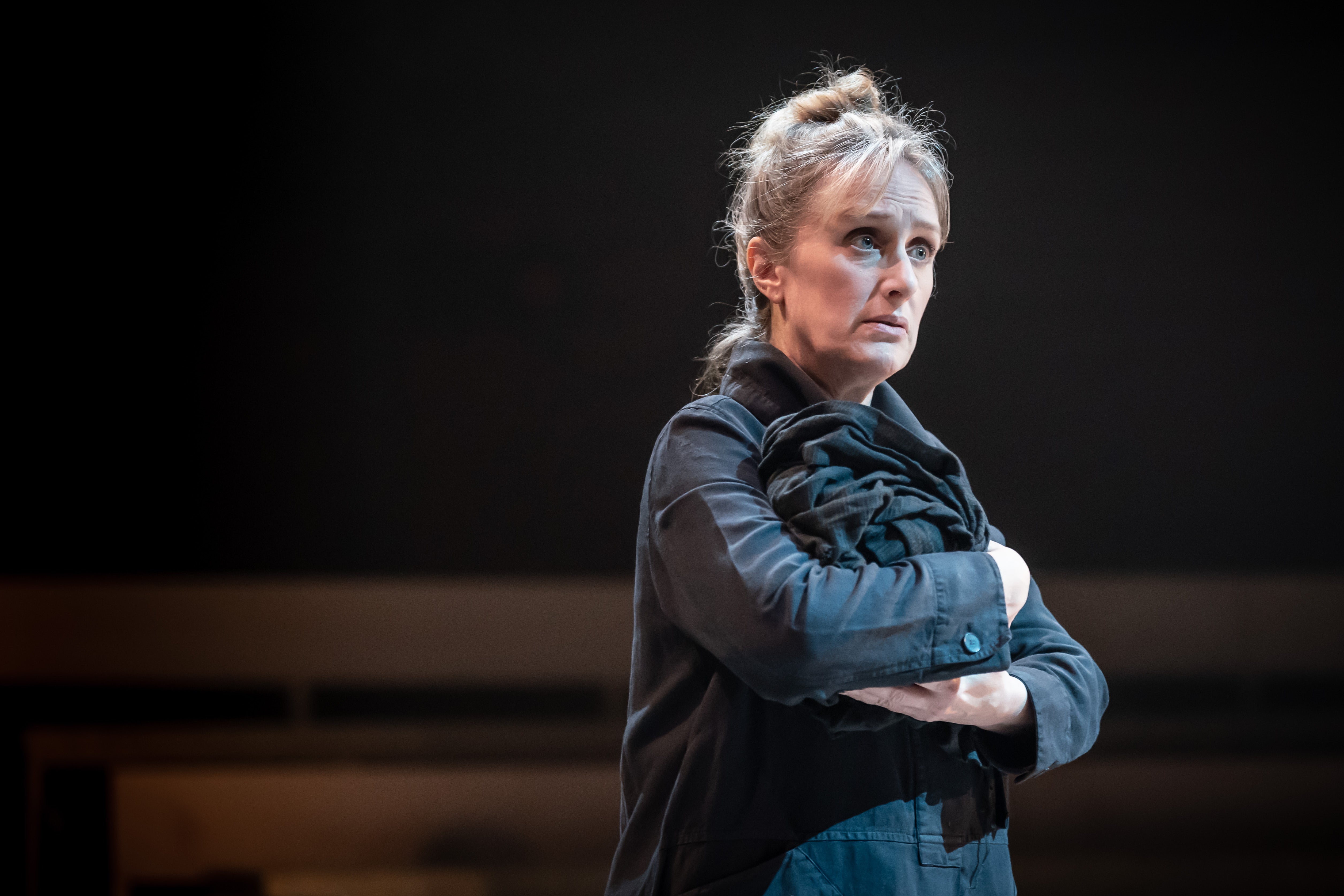
This week, the Bridge Theatre transforms into 1920s New York, Anne Reid stars in a Black Mirror-esque drama, and a new play at the Young Vic stages a revival of Scottish playwright Zinnie Harris’s second play.
Guys and Dolls – Bridge Theatre ★★★★☆
In Nicholas Hytner’s production of Guys and Dolls, nothing stays still for long: not the cast, not the audience, not even the stage. After acclaimed immersive productions of Julius Caesar and A Midsummer Night’s Dream, the Bridge Theatre boss turns the auditorium into Depression-era New York, a place that exists in a constant state of flux.
Hanging above the auditorium, bright neon signs point to the seedy underbelly of the city; a world of late nights and men who will gamble over just about anything. Nathan Detroit (Daniel Mays) is desperately trying to find a home for his next illegal crap game, while promising his fiancée of 14 years (girl, run) Adelaide (Marisha Wallace) that they’ll get married any day now. Nathan needs an impossible-to-lose wager and reckons he’s found one when he bets playboy Sky Masterson (Andrew Richardson) that he can’t “take a doll to Havana”, the doll in question being local preacher Sarah Brown (Celinde Schoenmaker).

Watching the swirling ensemble, you’ll find it hard to know where to look, but our leads confidently steer the show. Mays is slightly lacking in energy when he arrives on stage, but he swiftly picks up pace. Wallace, meanwhile, who recently picked up an Olivier nomination for her role in Oklahoma!, continues to dominate every musical she’s in. She doesn’t overdo this easy-to-overdo role, making the often twee “A Bushel and a Peck” genuinely sexy.
The show’s highlight comes from Nicely-Nicely Johnson (Cedric Neal), who gets those not already standing out of their seats with a showstopping rendition of “Sit Down, You’re Rockin’ The Boat”. In these big, powerful group songs, the ensemble comes together. There are no distractions, and the audience regains any lost focus. We’re reminded why we’re here: to see musical theatre titans at the top of their game, singing their hearts out. As classy revivals of major musicals go, you’ll struggle to find better. Isobel Lewis
Marjorie Prime – Menier Chocolate Factory ★★★☆☆
Anyone currently trembling in fear that their job will imminently be replaced by artificial intelligence will be soothed by the gentle vision of an android-filled future presented in Marjorie Prime. Brooklyn-based playwright Jordan Harrison wrote this lightly dystopian play nine years ago, before Chat GPT’s terrifyingly good AI software was successfully deployed to generate everything from movie posters to sonnets to wedding vows. Accordingly, he imagines a world where androids are flawed helpmeets to humans, rather than sinister overlords.
Last Tango in Halifax star Anne Reid is the warm beating heart of this show as 85-year-old Marjorie: she’s wonderfully ribald, full of life, and anything but pitiable as she lives with dementia. But then, she’s got lots to be cheerful about. She’s got Walter (Richard Fleeshman) to nudge her memory. He’s a “Prime”, or an accurate android facsimile of her late husband, forever aged 30 (it’s amusingly insinuated that she wanted him at his very hottest).

This play is set 40 years in the future, but AI could already easily create something with a Prime’s conversational skills now. And as AI throws up so many ethical talking points, it’s somewhat disappointing that Harrison’s hints at some of the darker possible uses of the Prime don’t come to much: this play’s tone is as even as a grey painted wall. Scenes move at a ponderous pace, static and talky, and bound by the limits of designer Jonathan Femson’s beautifully mellow wood-lined living room. Still, it’s a satisfying 80 minutes at the theatre with a more abstract final scene that gestures to a more chilling potential vision of the future, one where humans could be squeezed of their stories and then discarded, like used tubes of toothpaste. It’s a welcome note of terror in a play that often feels too cosy. Alice Saville
Further Than the Furthest Thing – Young Vic ★★★☆☆
Zinnie Harris’s 1999 play follows the inhabitants of a small, remote island who are forced to relocate to England when a natural disaster hits. In a week of nationwide protests against the government’s illegal migration bill, the Young Vic’s revival could hardly be more relevant. But as the play progresses, the topic begins to get lost among ever more outlandish and confusing storylines, muddling the focus.
The play begins on the unnamed island (based on Tristan da Cunha, where Harris lived for a few years as a child) to which the newly confident Francis (Archie Madekwe) is returning after spending a year in Cape Town. We meet his sweet aunt Mill (a mesmerising Jenna Russell) and fiery uncle Bill (Cyril Nri), who have little, yet appear happy. But Francis hasn’t come back alone; with him is Mr Hansen (Gerald Kyd), a textbook colonialist bad guy who schmoozes the family with magic tricks, before sharing his proposal to build a factory on the island. But then, a natural disaster strikes, and the residents flee to damp, smoggy England – a land of work, “the Queen and puddings”, as Mill laments.

It’s hard not to be enraptured by the island’s timeless world, where people’s lives are connected to the earth. They wear simple navy smocks and flat, split-toe shoes mimicking hooves. Around them, nature shimmers hypnotically, with neon waves and glistening stars projected on the slowly rotating stage. England is presented in sharp, clinical contrast in act two. The circular light and curved benches on stage may be reminiscent of an extra-terrestrial and crop circles, but the islanders are the aliens here. When Russell – who brings both depth and rare moments of comic relief to the show – recalls being mocked for always saying “is” instead of “am” or “are”, you can see the utter pain in her eyes.
Midway through the second half, Further Than the Furthest Thing goes off the rails. Mr Hansen, a cartoon villain with his cream jacket and slicked-back hair, has a random moment of honesty and delivers a lengthy monologue that takes the show into whole new territory. It’s a good twist, but one that doesn’t feel earned by the play. A later, equally lengthy, speech from Mill delivers another huge revelation. In the end, it all feels too frantic, too confused. Harris’s message – that nobody leaves home unless they have to – remains, but sometimes it’s hard to see it through the smog. IL







